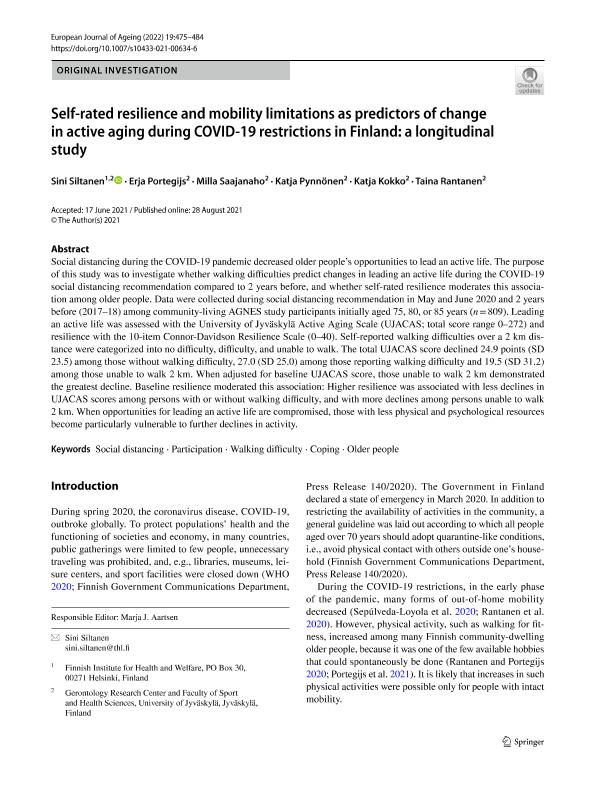| LDR | | | 00000cab a2200000 4500 |
| 001 | | | MAP20220023276 |
| 003 | | | MAP |
| 005 | | | 20220912091343.0 |
| 008 | | | 220912e20220905che|||p |0|||b|eng d |
| 040 | | | $aMAP$bspa$dMAP |
| 084 | | | $a931.2 |
| 245 | 0 | 0 | $aSelf-rated resilience and mobility limitations as predictors of change in active aging during COVID-19 restrictions in Finland$b: a longitudinal study$cSini Siltanen...[et.al.] |
| 520 | | | $aSocial distancing during the COVID-19 pandemic decreased older people's opportunities to lead an active life. The purpose of this study was to investigate whether walking difficulties predict changes in leading an active life during the COVID-19 social distancing recommendation compared to 2 years before, and whether self-rated resilience moderates this association among older people. Data were collected during social distancing recommendation in May and June 2020 and 2 years before (201718) among community-living AGNES study participants initially aged 75, 80, or 85 years (n = 809). Leading an active life was assessed with the University of Jyväskylä Active Aging Scale (UJACAS; total score range 0272) and resilience with the 10-item Connor-Davidson Resilience Scale (040). Self-reported walking difficulties over a 2 km distance were categorized into no difficulty, difficulty, and unable to walk. The total UJACAS score declined 24.9 points (SD 23.5) among those without walking difficulty, 27.0 (SD 25.0) among those reporting walking difficulty and 19.5 (SD 31.2) among those unable to walk 2 km. When adjusted for baseline UJACAS score, those unable to walk 2 km demonstrated the greatest decline. Baseline resilience moderated this association: Higher resilience was associated with less declines in UJACAS scores among persons with or without walking difficulty, and with more declines among persons unable to walk 2 km. When opportunities for leading an active life are compromised, those with less physical and psychological resources become particularly vulnerable to further declines in activity.
|
| 540 | | | $aLa copia digital se distribuye bajo licencia "Attribution 4.0 International (CC BY 4.0)"$f$uhttps://creativecommons.org/licenses/by/4.0$943 |
| 650 | | 4 | $0MAPA20200005599$aCOVID-19 |
| 650 | | 4 | $0MAPA20080568771$aEnvejecimiento |
| 651 | | 1 | $0MAPA20080638177$aFinlandia |
| 773 | 0 | | $wMAP20210024146$g05/09/2022 Volumen 19 Número 3 - 2022 , p. 475-484$tEuropean Journal of Ageing : social, behavioural and health perspectives$dCham, Switzerland [etc.] : Springer International Publishing AG, 2021- |
| 856 | | | $qapplication/pdf$w1116467$yRecurso electrónico / Electronic resource |


